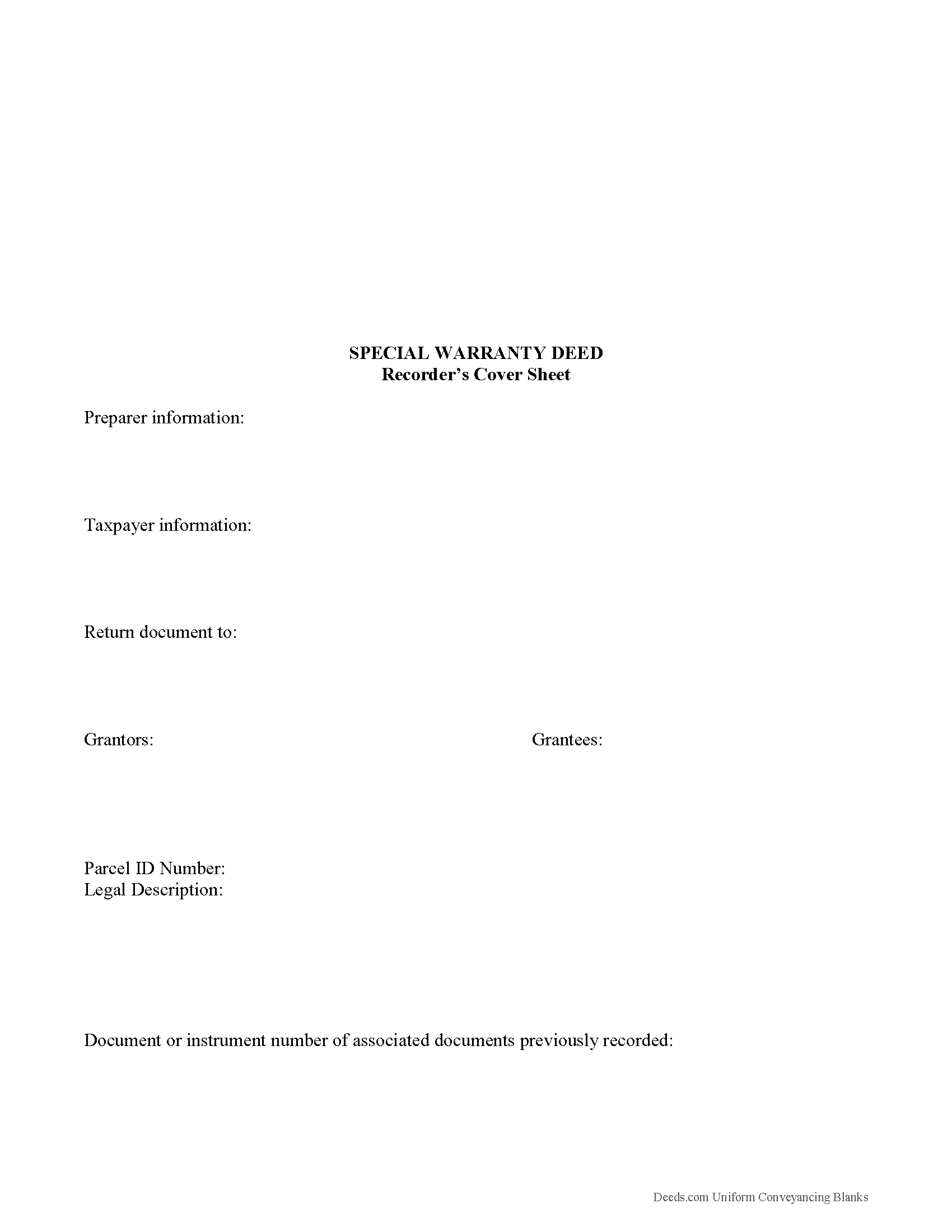Iowa Special Warranty Deed
County Forms
Where is the property located?
Adair CountyAdams CountyAllamakee CountyAppanoose CountyAudubon CountyBenton CountyBlack Hawk CountyBoone CountyBremer CountyBuchanan CountyBuena Vista CountyButler CountyCalhoun CountyCarroll CountyCass CountyCedar CountyCerro Gordo CountyCherokee CountyChickasaw CountyClarke CountyClay CountyClayton CountyClinton CountyCrawford CountyDallas CountyDavis CountyDecatur CountyDelaware CountyDes Moines CountyDickinson CountyDubuque CountyEmmet CountyFayette CountyFloyd CountyFranklin CountyFremont CountyGreene CountyGrundy CountyGuthrie CountyHamilton CountyHancock CountyHardin CountyHarrison CountyHenry CountyHoward CountyHumboldt CountyIda CountyIowa CountyJackson CountyJasper CountyJefferson CountyJohnson CountyJones CountyKeokuk CountyKossuth CountyLee CountyLinn CountyLouisa CountyLucas CountyLyon CountyMadison CountyMahaska CountyMarion CountyMarshall CountyMills CountyMitchell CountyMonona CountyMonroe CountyMontgomery CountyMuscatine CountyObrien CountyOsceola CountyPage CountyPalo Alto CountyPlymouth CountyPocahontas CountyPolk CountyPottawattamie CountyPoweshiek CountyRinggold CountySac CountyScott CountyShelby CountySioux CountyStory CountyTama CountyTaylor CountyUnion CountyVan Buren CountyWapello CountyWarren CountyWashington CountyWayne CountyWebster CountyWinnebago CountyWinneshiek CountyWoodbury CountyWorth CountyWright CountySpecial Warranty Deed for Real Estate Located in Iowa

A special warranty deed is a legal document used to transfer, or convey, rights in real property from a grantor (seller) to a grantee (buyer). This type of deed provides more liability protection for the grantor, and less protection for the buyer. In a special warranty deed, the grantor warrants against defects in the title during his or her ownership, and that he or she is authorized to sell it, but does not guarantee freedom from claims on the title originating before the grantor owned the property. Because of this risk, special warranty deeds are less common for residential real estate transactions. Instead, these types of deeds are typically used for foreclosed bank-owned properties and commercial properties that have changed ownership several times.
A lawful deed includes the grantor's full name and marital status, as well as the grantee's full name, marital status, mailing address, and vesting. Vesting describes how the grantee holds title to the property. For Iowa residential property, the primary methods for holding title in co-ownership are tenancy in common and joint tenancy. A grant of ownership of real estate to two or more unmarried persons is presumed to create a tenancy in common, unless a joint tenancy is specifically created (Iowa Code 557.15). A transfer to a married couple vests as a joint tenancy, unless otherwise stated (Iowa Code 557.15(3)(a)).
As with any conveyance of real estate, a special warranty deed requires a complete legal description of the parcel. Recite the source of title to establish a clear chain of title, and detail any restrictions associated with the property. Finally, the deed must meet all state and local standards for recorded documents.
The grantor must sign the completed deed in front of a notary. The acknowledgment (notary section), whether made within the State of Iowa, outside the state, outside the United States, or under federal authority, should comply with the provisions of chapter 9b of the Iowa Statutes. Once acknowledged, file it in the recorder's office in the county where the property is located.
Include all relevant documents, affidavits, forms, and fees along with the deed for recording. Most deeds require a separate Real Estate Transfer Groundwater Hazard Statement (Iowa Code Section 558.69). Consult the local recording office to confirm which supplemental materials are necessary for the specific transaction.
This article is provided for informational purposes only and is not a substitute for the advice of an attorney. Contact a lawyer with any questions about special warranty deeds, or for any other issues related to the transfer of real property in Iowa.
(Iowa Special Warranty Deed Package includes form, guidelines, and completed example)